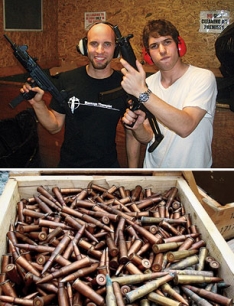Rolling Stone: The Stoner Arms Dealers

Rolling Stone
The e-mail confirmed it: everything was finally back on schedule after weeks of maddening, inexplicable delay. A 747 cargo plane had just lifted off from an airport in Hungary and was banking over the Black Sea toward Kyrgyzstan, some 3,000 miles to the east. After stopping to refuel there, the flight would carry on to Kabul, the capital of Afghanistan. Aboard the plane were 80 pallets loaded with nearly 5 million rounds of ammunition for AK-47s, the Soviet-era assault rifle favored by the Afghan National Army.
Reading the e-mail back in Miami Beach, David Packouz breathed a sigh of relief. The shipment was part of a $300 million contract that Packouz and his partner, Efraim Diveroli, had won from the Pentagon to arm America's allies in Afghanistan. It was May 2007, and the war was going badly. After six years of fighting, Al Qaeda remained a menace, the Taliban were resurgent, and NATO casualties were rising sharply. For the Bush administration, the ammunition was part of a desperate, last-ditch push to turn the war around before the U.S. presidential election the following year. To Packouz and Diveroli, the shipment was part of a major arms deal that promised to make them seriously rich.
Reassured by the e-mail, Packouz got into his brand-new blue Audi A4 and headed home for the evening, windows open, the stereo blasting. At 25, he wasn't exactly used to the pressures of being an international arms dealer. Only months earlier, he had been making his living as a massage therapist; his studies at the Educating Hands School of Massage had not included classes in military contracting or geopolitical brinkmanship.
But Packouz hadn't been able to resist the temptation when Diveroli, his 21-year-old friend from high school, had offered to cut him in on his burgeoning arms business. Working with nothing but an Internet connection, a couple of cellphones and a steady supply of weed, the two friends — one with a few college credits, the other a high school dropout — had beaten out Fortune 500 giants like General Dynamics to score the huge arms contract. With a single deal, two stoners from Miami Beach had turned themselves into the least likely merchants of death in history.
Arriving home at the Flamingo, his sleek condo with views of the bay, Packouz packed the cone of his Volcano, a smokeless electronic bong. As the balloon inflated with vapors from the high-grade weed, he took a deep toke and felt the pressures of the day drift away into a crisp, clean high.
Dinner was at Sushi Samba, a hipster Asian-Latino fusion joint. Packouz was in excellent spirits. He couldn't believe that he and Diveroli were actually pulling it off: Planes from all over Eastern Europe were now flying into Kabul, laden with millions of dollars worth of grenades and mortars and surface-to-air missiles. But as Packouz's miso-marinated Chilean sea bass arrived, his cellphone rang. It was the freight forwarder he had employed to make sure the ammunition made it from Hungary to Kabul. The man sounded panicked.
"We've got a problem," he told Packouz, shouting to be heard over the restaurant's thumping music. "The plane has been seized on the runway in Kyrgyzstan."
The arms shipment, it appeared, was being used as a bargaining chip in a high-stakes standoff between George W. Bush and Vladimir Putin. The Russian president didn't like NATO expanding into Kyrgyzstan, and the Kyrgyzs wanted the U.S. government to pay more rent to use their airport as a crucial supply line for the war in Afghanistan. Putin's allies in the Kyrgyz KGB, it seemed, were holding the plane hostage — and Packouz was going to be charged a $300,000 fine for every day it sat on the runway. Word of the seizure quickly reached Washington, and Defense Secretary Robert Gates himself was soon on his way to Kyrgyzstan to defuse the mounting tensions.
Packouz was baffled, stoned and way out of his league. "It was surreal," he recalls. "Here I was dealing with matters of international security, and I was half-baked. I didn't know anything about the situation in that part of the world. But I was a central player in the Afghan war — and if our delivery didn't make it to Kabul, the entire strategy of building up the Afghanistan army was going to fail. It was totally killing my buzz. There were all these shadowy forces, and I didn't know what their motives were. But I had to get my shit together and put my best arms-dealer face on."
Sitting in the restaurant, Packouz tried to clear his head, cupping a hand over his cellphone to shut out the noise. "Tell the Kyrgyz KGB that ammo needs to get to Afghanistan!" he shouted into the phone. "This contract is part of a vital mission in the global war on terrorism. Tell them that if they fuck with us, they are fucking with the government of the United States of America!"
Continue reading at Rolling Stone...
SPECIAL REPORT: Rolling Stone: Inside The FBI Plot Against Occupy

 Mar 1, 2013 at 1:19 AM
Mar 1, 2013 at 1:19 AM
Reader Comments (6)
I should have warned you. Reading this site will destroy your natural optimism and any belief in the goodness of elected and non-elected officials. It's a job hazard. I still believe in the goodness of my fellow man, but trust in any form granted to our government is a mistake.
http://www.whoownsthenews.com/
I believe everything I read & hear from the media in your link. lol